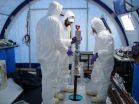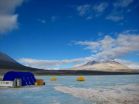(Press-News.org) RENO – This week a pioneering study published in the Proceedings of the National Academy of Sciences (PNAS) and co-authored by Dr. Alison Murray and Dr. Christian Fritsen of Nevada's Desert Research Institute (DRI) reveals, for the first time, a viable community of bacteria that survives and ekes out a living in a dark, salty and subfreezing environment beneath nearly 20 meters of ice in one of Antarctica's most isolated lakes.
Lake Vida, the largest of several unique lakes found in the McMurdo Dry Valleys, contains no oxygen, is mostly frozen and possesses the highest nitrous oxide levels of any natural water body on Earth. A briny liquid that is approximately six times saltier than seawater percolates throughout the icy environment that has an average temperature of minus 13.5 degrees centigrade (or 8 degrees Fahrenheit).
"This study provides a window into one of the most unique ecosystems on Earth," said Murray, the report's lead author, and molecular microbial ecologist and polar researcher for the past 17 years, who has participated in 14 expeditions to the Southern Ocean and Antarctic continent. "Our knowledge of geochemical and microbial processes in lightless icy environments, especially at subzero temperatures, has been mostly unknown up until now. This work expands our understanding of the types of life that can survive in these isolated, cryoecosystems and how different strategies may be used to exist in such challenging environments."
Despite the very cold, dark and isolated nature of the habitat, the report finds that the brine harbors a surprisingly diverse and abundant assemblage of bacteria that survive without a present-day source of energy from the sun. Previous studies of Lake Vida dating back to 1996 indicate that the brine and its' inhabitants have been isolated from outside influences for more than 3,000 years.
Murray and her co-authors and collaborators, including the project's principal investigator Dr. Peter Doran of the University of Illinois at Chicago, developed stringent protocols and specialized equipment for their 2005 and 2010 field campaigns to sample the lake brine while avoiding contaminating the pristine ecosystem.
To sample the unique environment researchers worked under secure, sterile tents on the lake's surface to keep the site and equipment clean as they drilled ice cores, collected samples of the salty brine residing in the lake ice and then assessed the chemical qualities of the water and its potential for harboring and sustaining life, in addition to describing the diversity of the organisms detected.
Geochemical analyses suggest that chemical reactions between the brine and the underlying iron-rich sediments generate nitrous oxide and molecular hydrogen. The latter, in part, may provide the energy needed to support the brine's diverse microbial life.
"It's plausible that a life-supporting energy source exists solely from the chemical reaction between anoxic salt water and the rock," explained Fritsen, a systems microbial ecologist and Research Professor in DRI's Division of Earth and Ecosystem Sciences.
"If that's the case," echoed Murray. "This gives us an entirely new framework for thinking of how life can be supported in cryoecosystems on earth and in other icy worlds of the universe."
Murray added further research is currently under way to analyze the abiotic, chemical interactions between the Lake Vida brine and the sediment, in addition to investigating the microbial community by using different genome sequencing approaches. The results could help explain the potential for life in other salty, cryogenic environments beyond Earth.
The Lake Vida brine also represents a cryoecosystem that is a suitable and accessible analog for the soils, sediments, wetlands, and lakes underlying the Antarctic ice sheet that other polar researchers are just now beginning to explore.
INFORMATION:
The funding for this research was supported jointly by the National Science Foundation (NSF) and the National Aeronautics and Space Administration (NASA).
About the Desert Research Institute:
DRI, the nonprofit research campus of the Nevada System of Higher Education, strives to be the world leader in environmental sciences through the application of knowledge and technologies to improve people's lives throughout Nevada and the world.
All DRI news releases available at: http://news.dri.edu/
Additional Details:
Proceedings of the National Academy of Sciences (PNAS)
Article #12-08607 - "Microbial Life at -13 ºC in the Brine of an Ice-Sealed Antarctic Lake," by Alison E. Murray et al.
More information on the Lake Vida project can be found online at: http://www.dri.edu/lake-vida
Photographs and Video available:
Field Work – including the ice core drilling process, Antarctic expedition, ice cores, and Lake Vida research team members.
Ancient microbes found living beneath the icy surface of Antarctic lake
DRI scientists' co-author study examining life in one of Earth’s coldest, ice-sealed ecosystems
2012-11-27
ELSE PRESS RELEASES FROM THIS DATE:
Possible new treatment for Ewing sarcoma
2012-11-27
SALT LAKE CITY— Discovery of a new drug with high potential to treat Ewing sarcoma, an often deadly cancer of children and young adults, and the previously unknown mechanism behind it, come hand-in-hand in a new study by researchers from Huntsman Cancer Institute (HCI) at the University of Utah. The report appears in today's online issue of the journal Oncogene.
"Ewing sarcoma is almost always caused by a cancer-causing protein called EWS/FLI," said Stephen Lessnick, M.D., Ph.D., director of HCI's Center for Children's Cancer Research, professor in the Department of ...
Bioengineered marine algae expands environments where biofuels can be produced
2012-11-27
Biologists at UC San Diego have demonstrated for the first time that marine algae can be just as capable as fresh water algae in producing biofuels.
The scientists genetically engineered marine algae to produce five different kinds of industrially important enzymes and say the same process they used could be employed to enhance the yield of petroleum-like compounds from these salt water algae. Their achievement is detailed in a paper published online in the current issue of the scientific journal Algal Research.
The ability to genetically transform marine algae into ...
Students at cooperative schools are more engaged
2012-11-27
This press release is available in Spanish.
Student engagement is not independent of the type of school attended.Nor is it independent of the organisational development of the school.The school's organisational style affects the work of its teaching staff, which, in turn, has repercussions on the performance and engagement of their students.As IkerRos, the UPV/EHU researcher, has been able to verify in his PhD thesis, these factors vary when comparing public schools, subsidised schools and co-operative schools, the latter being the ones that fare best.
"The study of ...
Dramatic rise in autism prevalence parallels research explosion
2012-11-27
(NEW YORK, N.Y., November 26, 2012) – Autism Speaks Chief Science Officer Geraldine Dawson, Ph.D. describes how the dramatic progress in autism research has paralleled increased recognition of autism's prevalence and financial impact in the December issue of the Archives of General Psychiatry published on line today. "This issue of the journal features three articles on autism," she writes in her editorial. "A decade ago, the journal published about the same number of autism articles per year."
Dr. Dawson also notes that, while the funding for autism research has dramatically ...
University of Maryland School of Medicine, NIH study pinpoints brain area's role in learning
2012-11-27
An area of the brain called the orbitofrontal cortex is responsible for decisions made on the spur of the moment, but not those made based on prior experience or habit, according to a new basic science study from substance abuse researchers at the University of Maryland School of Medicine and the National Institute on Drug Abuse (NIDA). Scientists had previously believed that the area of the brain was responsible for both types of behavior and decision-making. The distinction is critical to understanding the neurobiology of decision-making, particularly with regard to substance ...
Algae Biomass Organization hails new UCSD study showing saltwater algae viable for biofuels
2012-11-27
SAN DIEGO, Calif. (November 26, 2012) The Algae Biomass Organization, the trade association for the U.S. algae industry today hailed the findings of a University of California at San Diego study that concludes, for the first time, that marine (saltwater) algae can be just as capable as freshwater algae in producing biofuels. The research is documented in a peer-reviewed paper published online in the current issue of the scientific journal Algal Research.
"What this means is that you can use ocean water to grow the algae that will be used to produce biofuels. And once ...
Hearty organisms discovered in bitter-cold Antarctic brine
2012-11-27
EAST LANSING, Mich. — Where there's water there's life – even in brine beneath 60 feet of Antarctic ice, in permanent darkness and subzero temperatures.
While Lake Vida, located in the northernmost of the McMurdo Dry Valleys of East Antarctica, will never be a vacation destination, it is home to some newly discovered hearty microbes. In the current issue of the Proceedings of the National Academy of Sciences, Nathaniel Ostrom, Michigan State University zoologist, has co-authored "Microbial Life at -13ºC in the Brine of an Ice-Sealed Antarctic Lake."
Ostrom was part ...
Alaska's iconic Columbia Glacier expected to stop retreating in 2020, says CU-Boulder study
2012-11-27
The wild and dramatic cascade of ice into the ocean from Alaska's Columbia Glacier, an iconic glacier featured in the documentary "Chasing Ice" and one of the fastest moving glaciers in the world, will cease around 2020, according to a study by the University of Colorado Boulder.
A computer model predicts the retreat of the Columbia Glacier will stop when the glacier reaches a new stable position -- roughly 15 miles upstream from the stable position it occupied prior to the 1980s. The team, headed by lead author William Colgan of the CU-Boulder headquartered Cooperative ...
Gastric bypass surgery helps diabetes but doesn't cure it
2012-11-27
SEATTLE—After gastric bypass surgery, diabetes goes away for some people—often even before they lose much weight. So does that mean gastric surgery "cures" diabetes? Not necessarily, according to the largest community-based study of long-term diabetes outcomes after bariatric surgery. For most people in the study, e-published in advance of print in Obesity Surgery, diabetes either never remitted after gastric surgery or relapsed within five years.
Among the two thirds of the study's patients whose diabetes at first went away, more than a third re-developed diabetes again ...
To get the best look at a person's face, look just below the eyes, according to UCSB researchers
2012-11-27
They say that the eyes are the windows to the soul. However, to get a real idea of what a person is up to, according to UC Santa Barbara researchers Miguel Eckstein and Matt Peterson, the best place to check is right below the eyes. Their findings are published in the Proceedings of the National Academy of Sciences.
"It's pretty fast, it's effortless –– we're not really aware of what we're doing," said Miguel Eckstein, professor of psychology in the Department of Psychological & Brain Sciences. Using an eye tracker and more than 100 photos of faces and participants, Eckstein ...
LAST 30 PRESS RELEASES:
Pekingese, Shih Tzu and Staffordshire Bull Terrier among twelve dog breeds at risk of serious breathing condition
Selected dog breeds with most breathing trouble identified in new study
Interplay of class and gender may influence social judgments differently between cultures
Pollen counts can be predicted by machine learning models using meteorological data with more than 80% accuracy even a week ahead, for both grass and birch tree pollen, which could be key in effective
Rewriting our understanding of early hominin dispersal to Eurasia
Rising simultaneous wildfire risk compromises international firefighting efforts
Honey bee "dance floors" can be accurately located with a new method, mapping where in the hive forager bees perform waggle dances to signal the location of pollen and nectar for their nestmates
Exercise and nutritional drinks can reduce the need for care in dementia
Michelson Medical Research Foundation awards $750,000 to rising immunology leaders
SfN announces Early Career Policy Ambassadors Class of 2026
Spiritual practices strongly associated with reduced risk for hazardous alcohol and drug use
Novel vaccine protects against C. diff disease and recurrence
An “electrical” circadian clock balances growth between shoots and roots
Largest study of rare skin cancer in Mexican patients shows its more complex than previously thought
Colonists dredged away Sydney’s natural oyster reefs. Now science knows how best to restore them.
Joint and independent associations of gestational diabetes and depression with childhood obesity
Spirituality and harmful or hazardous alcohol and other drug use
New plastic material could solve energy storage challenge, researchers report
Mapping protein production in brain cells yields new insights for brain disease
Exposing a hidden anchor for HIV replication
Can Europe be climate-neutral by 2050? New monitor tracks the pace of the energy transition
Major heart attack study reveals ‘survival paradox’: Frail men at higher risk of death than women despite better treatment
Medicare patients get different stroke care depending on plan, analysis reveals
Polyploidy-induced senescence may drive aging, tissue repair, and cancer risk
Study shows that treating patients with lifestyle medicine may help reduce clinician burnout
Experimental and numerical framework for acoustic streaming prediction in mid-air phased arrays
Ancestral motif enables broad DNA binding by NIN, a master regulator of rhizobial symbiosis
Macrophage immune cells need constant reminders to retain memories of prior infections
Ultra-endurance running may accelerate aging and breakdown of red blood cells
Ancient mind-body practice proven to lower blood pressure in clinical trial
[Press-News.org] Ancient microbes found living beneath the icy surface of Antarctic lakeDRI scientists' co-author study examining life in one of Earth’s coldest, ice-sealed ecosystems




